- Home
- Pittacus Lore
Generation One LLR Page 3
Generation One LLR Read online
Page 3
The guidance counselor asked if any of the students had experienced “visions” or “out-of-body experiences” because apparently those were things now. Taylor couldn’t believe that the teachers were talking about this stuff so casually, like they’d just been plucked out of a comic book.
In the hall after, some boys joked about their “night visions” and Taylor groaned and rolled her eyes, secretly feeling relief that everyone at her school was normal.
“We’re taking a road trip to Chicago this weekend to see the crashed warship,” Taylor’s friend Claire told her on the bus one day, a few months after the invasion.
“What?” Taylor replied. “Really?”
“I saw some girls on Insta, they got so close, that ugly-ass ship is like right behind them. So many likes,” Claire continued. “Maybe if I get close enough, I’ll score some Legacies.”
Taylor rolled her eyes. “I don’t think that’s how it works.”
“They’re alien powers! No one knows how it works!” Claire laughed and nudged Taylor’s ribs. “Come on. Like you don’t want telekinesis or whatever.”
“And get sent away to their weird alien Academy?” Taylor snorted. “No thanks.”
“You’d probably get to meet John Smith,” Claire replied. “He’s so hot.”
“Really? He always looks like he’s about to cry in all those pictures.”
“He’s soulful! You’re such a downer,” Claire said without any malice. “So, do you want to come with us this weekend or what?”
Taylor didn’t know how to explain to Claire that she liked their peaceful bubble of Turner County without sounding lame. So she lied about having too much work due and how her dad needed her help. She didn’t need an up-close-and-personal view of an alien warship. Too real.
“It’s like, everyone’s already treating what happened like it’s totally normal,” Taylor said to her dad over dinner that night.
Her dad shrugged. “That’s just people, hon. Given enough time, they can adjust to damn near anything. A few hundred years ago, if you’d shown folks an airplane or a cell phone, their heads would’ve exploded. I thought getting wireless internet out here on the farm would be the most awe-inspiring thing I saw in my lifetime. Pretty cool to be wrong.”
“Wasn’t so cool for all the people who died,” Taylor said, pushing some corn around on her plate.
“No, that’s true,” her dad replied gently. “It can be a lot to wrap your head around. But we’re safe here. You know that, right? Ain’t nobody bothering little old Turner County.”
Her dad was right. Taylor was comforted that Turner County remained pretty much unchanged in this brave new world. The articles she read about teenagers with Legacies speculated that everyone who was going to get the enhanced abilities had already gotten them—that it was a side effect of the war triggered by the Loric and that now it would stop.
They were wrong about that.
And eventually, her dad would be proved wrong about Turner County.
CHAPTER FOUR
TARGET #1
ARNHEM LAND, AUSTRALIA
THE CESSNA CAME IN LOW OVER THE TINY ABORIGINAL village, sought the dusty runway and bounced through a landing on the hard-packed ground. Nearby, a group of the villagers huddled around a fire and prepared a freshly killed sea turtle for dinner. They stuffed the spear-holes in the animal’s shell with twigs and then buried it beneath coals so that the meat inside the shell would cook. They paused in their work to exchange glances as the plane’s engine rumbled to a stop. It was dusk and they weren’t expecting visitors.
For this village, tiny was perhaps an understatement. Only fifty aboriginals lived here, in the train-car-shaped houses just a stone’s throw from the Timor Sea. The walls were made of corrugated steel, these all painted vividly with images of stingrays and turtles and colorful dots and stripes. Dogs that straddled the line between stray and domesticated weaved in and out of the mango and banana trees, barking at the plane.
Jedda, the village’s matriarch, eyed the plane warily from the steps of her home, smoking a pipe. She was in possession of the village’s lone satellite phone.
Even if she had called for help right then, it would not have arrived in time.
From inside the airplane, Einar watched the villagers shuffle about. He could tell they were uneasy. He was nervous, too. This was his first operation on behalf of the Foundation and he badly wanted it to go smoothly. Needed it to go smoothly. He wondered if this little village even knew that there had been an alien invasion, if they knew how much the world had changed in the last four months. He could see the glow of a TV set inside one of the houses. They weren’t entirely cut off from society out here in the bush.
Still, he wondered if they even understood what they possessed.
Einar’s gaze drifted away from the villagers and towards a tree where the fat leaves seemed to shift oddly on the wind. Not leaves. Those were bats. Dozens of them hanging upside down from the thinning branches.
He suppressed a shudder. It wouldn’t be good to show weakness. Not considering his present company.
Sandwiched into the small plane with Einar were six very nasty-looking men. Mercenaries. All of them dressed in black body armor and carrying excessively large machine guns. Their leader was a Norwegian named Jarl, red-bearded with bulging neck muscles, a hooked scar that ran from his eye to the corner of his mouth. He and his men hadn’t been much for conversation during the journey. The Blackstone Group weren’t used to having a seventeen-year-old in charge of them. Einar wondered how much the Foundation was paying them.
Einar stood and delicately rolled up the sleeves of his shirt. He looked at Jarl. The men knew their orders; he didn’t need to go over them again. Instead, he pointed at the serrated combat knife strapped to Jarl’s belt.
“May I?” Einar asked.
Jarl handed him the knife handle first. Without hesitating, Einar gritted his teeth and dragged the blade across the inside of his forearm.
The villagers were taken by surprise when Einar stumbled off the plane. A young, pale-skinned boy, dressed in sharply pressed chinos and a white dress shirt, carrying a stylish attaché case, his brown hair parted from the side. Some rich gubba whose plane lost his way? An intern from one of the mining companies that were always trying to buy up their land?
Bleeding from a cut on his arm. Deep and getting all over his shirt. The guy held up his arm.
“Hello? I’m sorry. Can someone help?”
Only half the aboriginals spoke English, but they all got the gist. They exchanged looks. One of the boys tending to the turtle—no more than fourteen, dark-skinned, with a mane of curly black hair—started immediately toward Einar. Jedda barked something at him in Yolngu Matha, a warning, but the boy waved her off.
He couldn’t explain it, but he felt an overwhelming urge to help this injured white boy. He felt like the stranger was an old friend.
“I’m Einar,” he said. “Do you speak English?”
“Yeah. I’m Bunji,” the aboriginal replied. He took Einar’s arm in his hands, his touch gentle despite the calluses on his palms. “What ya doing way out here?”
“Lost,” Einar replied. “Lost and hurt, as you can see.”
“Not for long,” Bunji declared, unable to keep the pride and excitement out of his voice.
Some of the other villagers had edged closer. They always wanted to watch Bunji use his gift, which he’d first discovered when his older brother had accidentally cut his hand on a fishing line.
Bunji pressed his hand onto Einar’s arm, not mindful of the blood. He squinted, and Einar felt a wave of warm energy wash into him. The sensation that followed was like a pleasant tickle.
When Bunji took his hand away, Einar’s cut was gone. His arm was healed.
“Remarkable,” Einar said, smiling at Bunji. “My friend, can you do this?”
Einar held up his attaché, then let it go. The case floated there, suspended in midair by telekinesis. Some of the vill
agers gasped. Bunji grinned and laughed.
“You! You’re like me!” The aboriginal reached out with his own telekinesis and levitated a handful of nearby stones. He floated them around the two of them like tiny meteors orbiting a planet.
“Indeed,” Einar said, and opened his floating attaché, produced a tranquilizer gun and shot Bunji in the neck. All the rocks he was levitating fell out of the air.
By the time the stones hit the ground, Jarl and his men were stepping off the plane, their guns clicking as the safeties were flicked off. They took care of the villagers while Einar carried Bunji to the plane.
The Foundation would be pleased.
CHAPTER FIVE
THE PATIENCE CREEK SURVIVORS
AN UNDISCLOSED LOCATION
AFTER DANIELA LEFT FOR NEW YORK, THE REMAINING Human Garde spent three idle months at the island military base, basically in limbo while they waited for construction of the Academy to finish. Ran and Nigel played a lot of chess, using their telekinesis to move the pieces around the board. Caleb started to grow his hair out and kept to himself. Ran’s room was right next to Caleb’s and, at night, she could hear him talking to himself—arguing with one of his duplicates—but she never mentioned this to anyone.
Nothing much happened at the base. Apparently, the only job of the military personnel stationed there was to watch over the three of them. Around the world, other newly discovered Human Garde endured similar holding patterns, waiting for the Academy to officially open. The days blended together.
Until, two days before they were to depart for California, they came for the Chimærae.
“Colonel Ray Archibald has been assigned to lead security at this new Academy. He’s a good man. Held down NORAD during the invasion. I briefed him on the three extraterrestrial creatures you and the others are in possession of. It’s the colonel’s opinion—and Earth Garde backs him up on this—that the animals pose a liability.”
General Lawson stoically imparted all this to Caleb from behind his desk. Caleb sat opposite, perfectly at attention as usual. Regal, his hawk-shaped Chimæra, was perched on his forearm, his talons a gentle pressure. Idly, Caleb stroked his Chimæra’s feathers.
Two scientists sent by the UN hovered at the edge of the room. One of them held a cage made of bulletproof glass, the airholes on the sides no bigger than pinpricks. The other wore latex gloves and brandished a syringe filled with some kind of sedative. They both watched Regal nervously, although the Chimæra paid them no attention whatsoever.
“Oh,” was all Caleb managed to say to his uncle.
“Over the next six weeks, that Academy’s going to be filling up with more than a hundred Human Garde, wild-ass teenagers all, from dozens of different countries. It’s going to be a logistical nightmare keeping that place safe without adding shape-shifting monsters into the mix. You get me?”
Caleb nodded.
“Plus, we don’t know what diseases these Chimærae could be carrying. They can transform into damn near anything. The Loric didn’t think much of our environment when they set all this loose,” Lawson continued.
Caleb looked into Regal’s face. The bird cocked his head and flexed his beak. He didn’t look sick to Caleb, but his uncle probably knew best.
“Okay,” Caleb said, unable to keep some glumness out of his voice.
“It’s just temporary,” Lawson said. “Until the lab coats have a chance to check these beasts over, make sure they aren’t a risk. You’ll get Regal here back once he’s been cleared.”
“I understand,” Caleb replied, swallowing. “I . . . have you told Ran and Nigel yet? They won’t . . . I don’t think they’ll like this very much.”
“I hoped that you’d help me convince them,” Lawson said. “I know those two are . . . headstrong.”
Caleb snorted. “They won’t listen to me.”
“Well, we aren’t really having a discussion,” Lawson said with a stiff shrug. “This is the way it’s gonna be. They’ll fall in line.”
At a wave from Lawson, the two scientists approached Caleb and Regal. Caleb felt Regal’s talons tighten on his arm, the Chimæra shifting uneasily. He held his free hand out towards the scientist with the injection.
“Better let me do it,” he said. “He doesn’t trust you guys.”
The doctor seemed relieved to hand over the injection to Caleb. Regal’s dark eyes blinked, his head cocked, as he looked from Caleb to the needle.
“Sorry, buddy. I know this sucks,” Caleb whispered to his Chimæra, hopeful that his uncle wouldn’t overhear, or at least wouldn’t judge him for being soft. “It’s for the best, I guess.”
Regal let out a squawk when the needle went in. Caleb thought it sounded more like sadness than it did pain, but he beat back this thought. Just like he beat back the duplicate that was trying to leap out of him, bundle up Regal and sprint as far away as possible.
Once Regal was peacefully asleep in his cage, they went in search of the other Garde and their Chimærae. Caleb had trouble keeping his shoulders from slumping on the way.
They found Nigel first, lounging in the hammock he’d hooked up in his room, listening to some screeching punk rock through a pair of oversized headphones. Bandit, surly-looking as his owner, rested on Nigel’s belly with his furry legs up in the air.
“Mr. Barnaby, we need a moment—,” Lawson began.
Nigel spotted the scientists—their gloves, the cage, the needle. He read the sullen look on the face of that goodie-two-shoes Caleb. He got the picture quickly.
“My arse! Run, Bandit! Escape the bloody fascists!”
Bandit listened. He dove off Nigel and transformed in the air, shrinking down to a mouse. He scurried toward the nearest air vent, the scientists too mesmerized by the transformation to react.
Not Caleb. He had orders. With a flick of his telekinesis, he shut the vent, cutting off Bandit’s escape route. Then he plucked the fleeing Chimæra up, holding him telekinetically aloft, gently, his legs kicking. Bandit started to transform into a larger form—dark fur, claws and fangs. Before things could get any further out of hand, Lawson snatched the tranquilizer syringe from the frozen scientist and jabbed it into Bandit’s morphing haunch.
“Young man, I appreciate your loyalty to this animal, but Earth Garde has determined—”
Lawson made it only that far through his lecture before Nigel punched him in the jaw.
Nigel was scrawny and hadn’t thrown a lot of punches in his life, but what his punch lacked in power it made up for in passion. Not to mention the element of surprise. The blow caught Lawson off guard and sent the old man stumbling back. He ended up flopping right into Nigel’s hammock, his legs kicked awkwardly up in the air.
Two duplicates sprung forth from Caleb and grabbed Nigel by the arms, pinning him up against the wall.
“You’re just making things worse, Nigel!” Caleb yelled, the duplicates echoing his words.
“Shove it up your ass, ya sellout wanker,” Nigel replied. Then he took a deep gulp of air and bellowed, his sonic manipulation Legacy making his next words loud enough to rattle the walls, not to mention make everyone in the room wince and stumble.
“RAN! THEY’RE STEALING THE CHIMÆRAE!”
Nigel’s siren-like scream reached Ran all the way on the beach. She sat cross-legged, peaceful up until that point. Gamora basked in the sun next to her. At Nigel’s scream, Gamora craned his stout neck to look up at Ran. She frowned thoughtfully, gently scratching Gamora under his chin.
“Better go into the water,” she told him in Japanese. “Find me when it is safe, my friend.”
Gamora seemed to understand. He trundled to the shoreline, glanced back once and then plunged gracefully into the ocean. Ran sighed.
Their departure for the Academy wasn’t off to the best start.
CHAPTER SIX
KOPANO OKEKE
LAGOS, NIGERIA
WORD OF THE INCIDENT ON THE FOOTBALL PITCH traveled fast. Kopano was famous. Yesterday’s tormenters wer
e today’s spokespeople, telling all their friends that Alien Boy Kopano was for real. Despite his mistreatment at their hands, Kopano didn’t harbor any resentment towards those witnesses to his big day. In fact, he regarded them fondly, like a reluctant baby bird might view the cruel mother that launched him from the nest. Kopano didn’t hold a grudge.
Everyone wanted to see what Kopano could do. “Prove it,” they kept saying, the same challenge over and over. “Prove it.”
By the end of the next school day, Kopano’s face hurt from grinning. He’d spent much of the day doing tricks—levitating desks, juggling objects, even flying a couple of his screaming classmates through the lunchroom. His teachers were in awe, uncertain what the protocol was in matters of superpowered disruption. Kopano was one of their better students, usually quiet and courteous, so they let him have his day. After dismissal, the principal pulled him aside.
“What is happening to you is very good,” the principal said. “You will be the pride of Nigeria. But please, Kopano, you must understand, this is a place of learning. You must try not to be so distracting to the other students.”
“Not to worry,” Kopano boasted. “Soon, I will be joining the Garde in America.”
Kopano went home and told his family about what the principal said. His mother shook her head wearily. She’d spent the entire day at church. She told Kopano that she was praying for his safety, but Kopano was certain that meant she was trying to pray away his Legacies.
“Be careful, Kopano,” his mother warned. “If you keep making a spectacle of yourself, they will come take you away. Or worse.”
Kopano knew what his mother was talking about. Ever since the invasion, he’d been devouring every bit of news about the Loric and the changes they’d wrought. He had begged his father to drive him to Zuma Rock, where an outcropping of Loralite stone had grown, but Udo complained it would be a waste of time since the UN Security Council had set up a base there and weren’t letting just anyone take tours. Also, Udo reasoned, the government might snatch him up if they got that close.

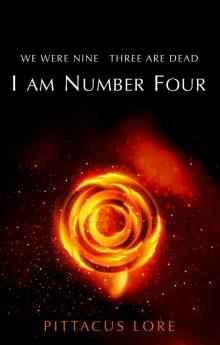 I Am Number Four
I Am Number Four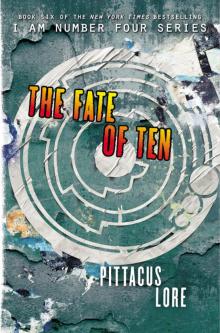 The Fate of Ten
The Fate of Ten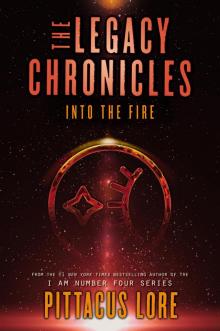 The Legacy Chronicles - Into the Fire
The Legacy Chronicles - Into the Fire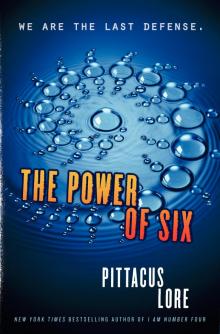 The Power of Six
The Power of Six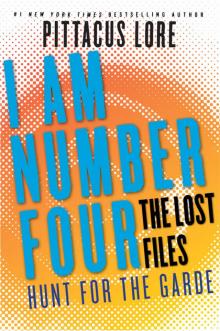 Hunt for the Garde
Hunt for the Garde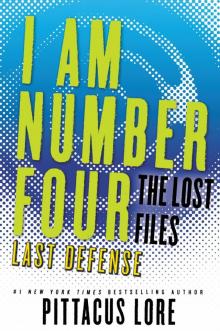 Last Defense
Last Defense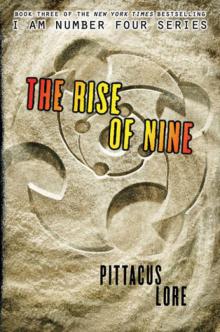 The Rise of Nine
The Rise of Nine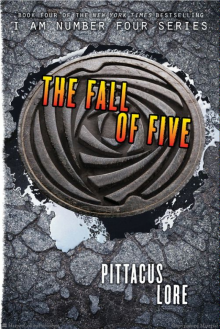 The Fall of Five
The Fall of Five The Fugitive
The Fugitive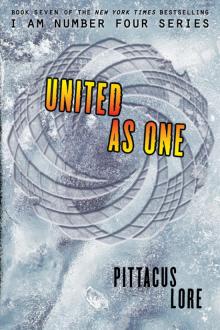 United as One
United as One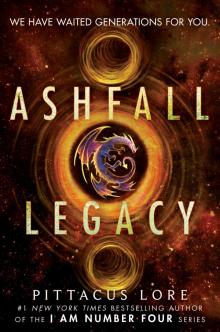 Ashfall Legacy
Ashfall Legacy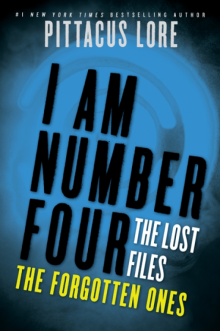 The Forgotten Ones
The Forgotten Ones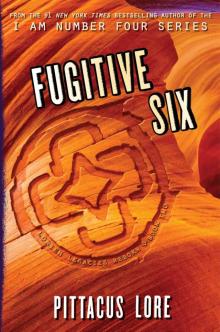 Fugitive Six
Fugitive Six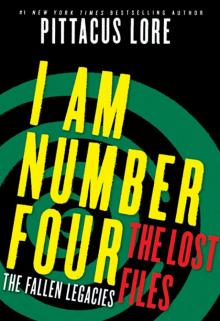 The Fallen Legacies
The Fallen Legacies![[Lorien Legacies 04.95] The Lost Files: Five's Betrayal Read online](http://i1.bookreadfree.com/28/lorien_legacies_04_95_the_lost_files_fives_betrayal_preview.jpg) [Lorien Legacies 04.95] The Lost Files: Five's Betrayal
[Lorien Legacies 04.95] The Lost Files: Five's Betrayal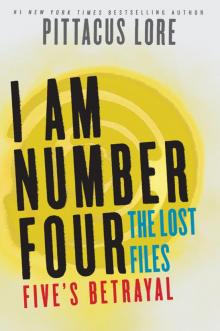 Five's Betrayal
Five's Betrayal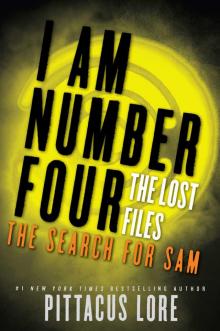 The Search for Sam
The Search for Sam![[Lorien Legacies 04.85] The Lost Files: The Forgotten Ones Read online](http://i1.bookreadfree.com/28/lorien_legacies_04_85_the_lost_files_the_forgotten_ones_preview.jpg) [Lorien Legacies 04.85] The Lost Files: The Forgotten Ones
[Lorien Legacies 04.85] The Lost Files: The Forgotten Ones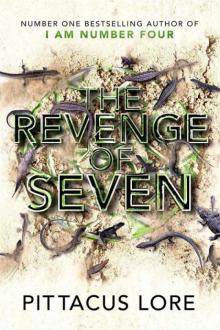 The Revenge of Seven
The Revenge of Seven![[Lorien Legacies 06.3] The Lost Files: Hunt for the Garde Read online](http://i1.bookreadfree.com/07/lorien_legacies_06_3_the_lost_files_hunt_for_the_garde_preview.jpg) [Lorien Legacies 06.3] The Lost Files: Hunt for the Garde
[Lorien Legacies 06.3] The Lost Files: Hunt for the Garde![[Lorien Legacies 04.0] The Fall of Five Read online](http://i1.bookreadfree.com/03/lorien_legacies_04_0_the_fall_of_five_preview.jpg) [Lorien Legacies 04.0] The Fall of Five
[Lorien Legacies 04.0] The Fall of Five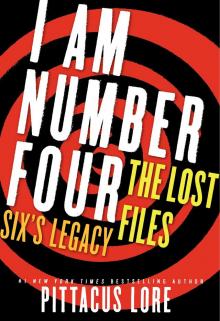 Nines Legacy
Nines Legacy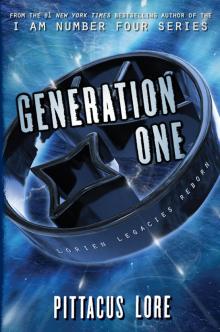 Generation One LLR
Generation One LLR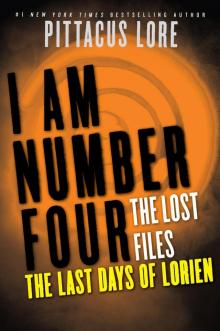 The Last Days of Lorien
The Last Days of Lorien![[Lorien Legacies 05.1] The Lost Files: The Fugitive Read online](http://i1.bookreadfree.com/i/03/14/lorien_legacies_05_1_the_lost_files_the_fugitive_preview.jpg) [Lorien Legacies 05.1] The Lost Files: The Fugitive
[Lorien Legacies 05.1] The Lost Files: The Fugitive![[Lorien Legacies 06.0] The Fate of Ten Read online](http://i1.bookreadfree.com/07/lorien_legacies_06_0_the_fate_of_ten_preview.jpg) [Lorien Legacies 06.0] The Fate of Ten
[Lorien Legacies 06.0] The Fate of Ten![[Lorien Legacies 06.2] The Lost Files: Last Defense Read online](http://i1.bookreadfree.com/08/lorien_legacies_06_2_the_lost_files_last_defense_preview.jpg) [Lorien Legacies 06.2] The Lost Files: Last Defense
[Lorien Legacies 06.2] The Lost Files: Last Defense![[Lorien Legacies 04.9] The Lost Files: Five's Legacy Read online](http://i1.bookreadfree.com/i/03/16/lorien_legacies_04_9_the_lost_files_fives_legacy_preview.jpg) [Lorien Legacies 04.9] The Lost Files: Five's Legacy
[Lorien Legacies 04.9] The Lost Files: Five's Legacy The Navigator
The Navigator![[Lorien Legacies 04.94] The Lost Files: Return to Paradise Read online](http://i1.bookreadfree.com/i/03/13/lorien_legacies_04_94_the_lost_files_return_to_paradise_preview.jpg) [Lorien Legacies 04.94] The Lost Files: Return to Paradise
[Lorien Legacies 04.94] The Lost Files: Return to Paradise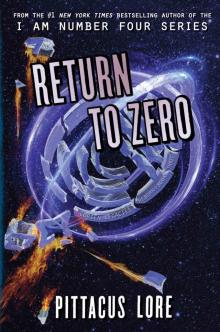 Return to Zero
Return to Zero![[Lorien Legacies 01.5] The Lost Files: The Fallen Legacies Read online](http://i1.bookreadfree.com/09/lorien_legacies_01_5_the_lost_files_the_fallen_legacies_preview.jpg) [Lorien Legacies 01.5] The Lost Files: The Fallen Legacies
[Lorien Legacies 01.5] The Lost Files: The Fallen Legacies![[Lorien Legacies 05.7] The Lost Files: The Guard Read online](http://i1.bookreadfree.com/i/03/13/lorien_legacies_05_7_the_lost_files_the_guard_preview.jpg) [Lorien Legacies 05.7] The Lost Files: The Guard
[Lorien Legacies 05.7] The Lost Files: The Guard![[Lorien Legacies 06.1] The Lost Files: Legacies Reborn Read online](http://i1.bookreadfree.com/i/03/13/lorien_legacies_06_1_the_lost_files_legacies_reborn_preview.jpg) [Lorien Legacies 06.1] The Lost Files: Legacies Reborn
[Lorien Legacies 06.1] The Lost Files: Legacies Reborn![[Lorien Legacies 03.0] The Rise of Nine Read online](http://i1.bookreadfree.com/10/lorien_legacies_03_0_the_rise_of_nine_preview.jpg) [Lorien Legacies 03.0] The Rise of Nine
[Lorien Legacies 03.0] The Rise of Nine![[Lorien Legacies 02.0] The Power of Six Read online](http://i1.bookreadfree.com/i/03/14/lorien_legacies_02_0_the_power_of_six_preview.jpg) [Lorien Legacies 02.0] The Power of Six
[Lorien Legacies 02.0] The Power of Six![[Lorien Legacies 04.6] The Lost Files: The Search for Sam Read online](http://i1.bookreadfree.com/i/03/17/lorien_legacies_04_6_the_lost_files_the_search_for_sam_preview.jpg) [Lorien Legacies 04.6] The Lost Files: The Search for Sam
[Lorien Legacies 04.6] The Lost Files: The Search for Sam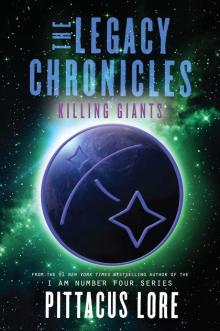 The Legacy Chronicles: Killing Giants
The Legacy Chronicles: Killing Giants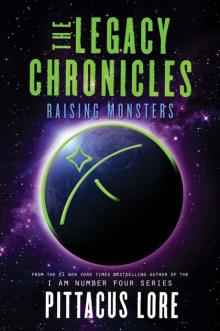 The Legacy Chronicles: Raising Monsters
The Legacy Chronicles: Raising Monsters![[Lorien Legacies 05.4] The Lost Files: The Navigator Read online](http://i1.bookreadfree.com/i/03/17/lorien_legacies_05_4_the_lost_files_the_navigator_preview.jpg) [Lorien Legacies 05.4] The Lost Files: The Navigator
[Lorien Legacies 05.4] The Lost Files: The Navigator![[Lorien Legacies 07.0] United as One Read online](http://i1.bookreadfree.com/i/03/18/lorien_legacies_07_0_united_as_one_preview.jpg) [Lorien Legacies 07.0] United as One
[Lorien Legacies 07.0] United as One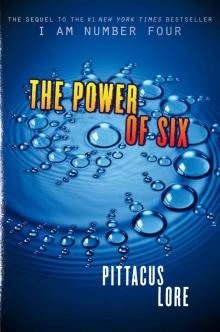 The Power of Six (I Am Number Four)
The Power of Six (I Am Number Four)![[Lorien Legacies 03.5] The Lost Files: Nine's Legacy Read online](http://i1.bookreadfree.com/i/03/18/lorien_legacies_03_5_the_lost_files_nines_legacy_preview.jpg) [Lorien Legacies 03.5] The Lost Files: Nine's Legacy
[Lorien Legacies 03.5] The Lost Files: Nine's Legacy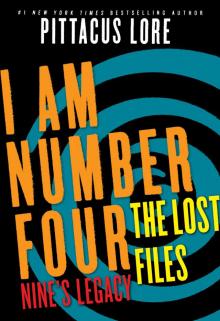 I Am Number Four: The Lost Files: Nine’s Legacy
I Am Number Four: The Lost Files: Nine’s Legacy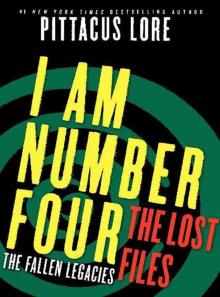 The Lost Files: The Fallen Legacies (i am number four)
The Lost Files: The Fallen Legacies (i am number four)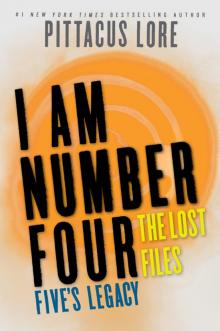 Five's Legacy
Five's Legacy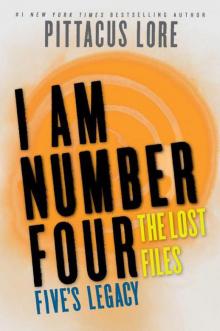 I Am Number Four: The Lost Files: Five's Legacy
I Am Number Four: The Lost Files: Five's Legacy![[Lorien Legacies 05.0] The Revenge of Seven Read online](http://i1.bookreadfree.com/i1/03/30/lorien_legacies_05_0_the_revenge_of_seven_preview.jpg) [Lorien Legacies 05.0] The Revenge of Seven
[Lorien Legacies 05.0] The Revenge of Seven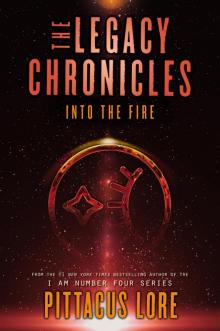 The Legacy Chronicles
The Legacy Chronicles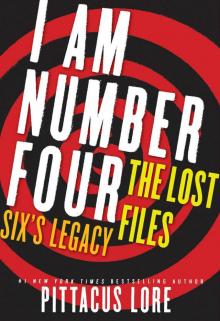 The Lost Files: Six's Legacy
The Lost Files: Six's Legacy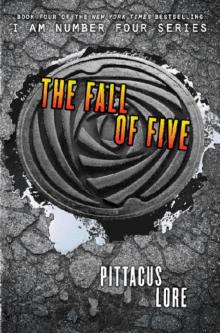 The Fall of Five (I Am Number Four)
The Fall of Five (I Am Number Four)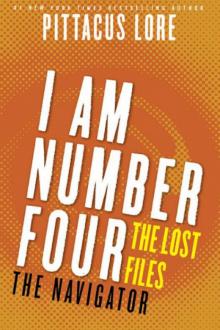 The Lost Files: The Navigator
The Lost Files: The Navigator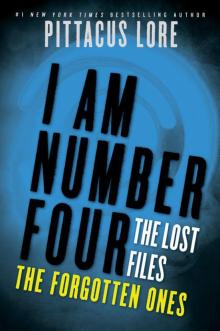 I Am Number Four: The Lost Files: The Forgotten Ones
I Am Number Four: The Lost Files: The Forgotten Ones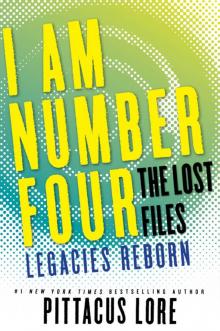 Legacies Reborn
Legacies Reborn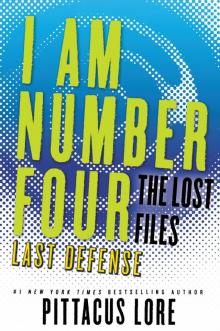 I Am Number Four: The Lost Files: Last Defense
I Am Number Four: The Lost Files: Last Defense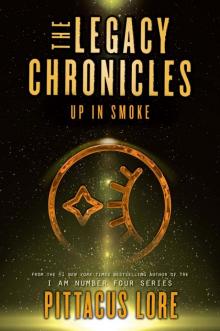 The Legacy Chronicles_Up in Smoke
The Legacy Chronicles_Up in Smoke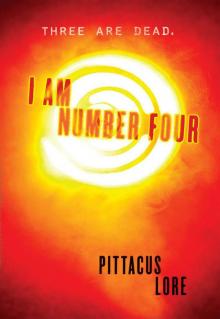 I Am Number Four ll-1
I Am Number Four ll-1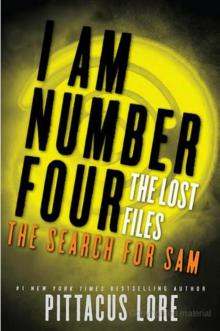 The Search for Sam lltlf-4
The Search for Sam lltlf-4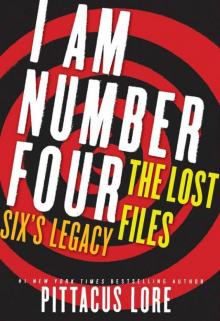 The Lost Files: Six's Legacy (lorien legacies)
The Lost Files: Six's Legacy (lorien legacies)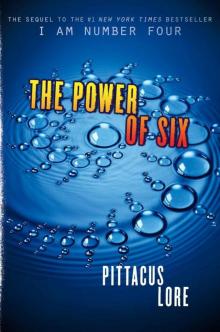 The Power of Six tll-2
The Power of Six tll-2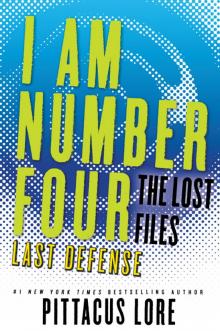 I Am Number Four: The Lost Files #14
I Am Number Four: The Lost Files #14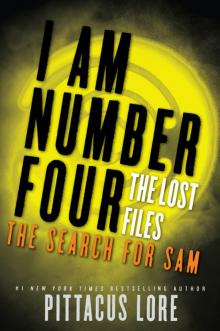 I Am Number Four: The Lost Files: The Search for Sam
I Am Number Four: The Lost Files: The Search for Sam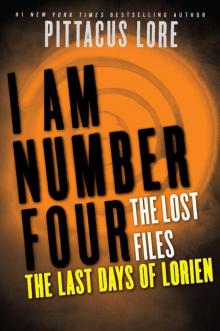 I Am Number Four: The Lost Files: The Last Days of Lorien
I Am Number Four: The Lost Files: The Last Days of Lorien